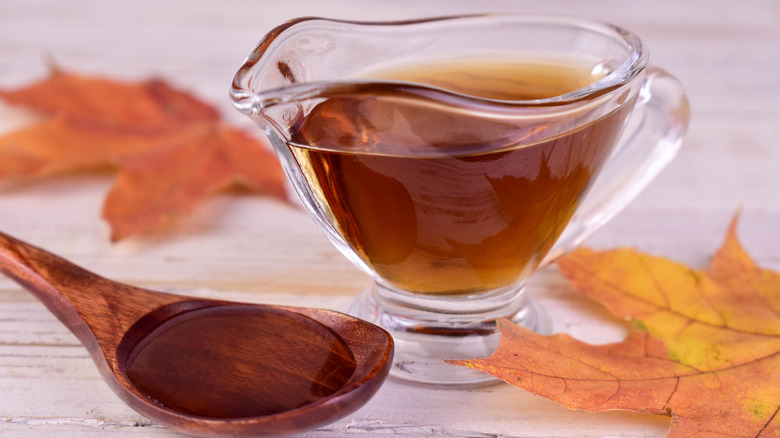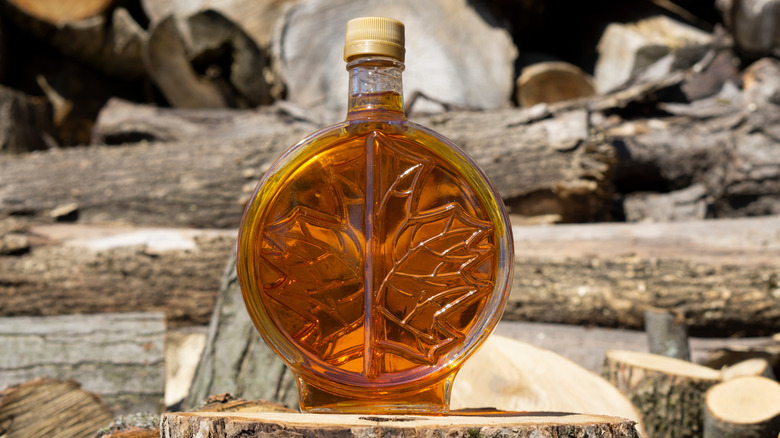Canadian Vs American Maple Syrup: What's The Difference?
Canada's maple-leaf flag couldn't be a more emphatic assertion that maple syrup is a part of Canada's national heritage. According to the Department of Agriculture and Agri-Food Canada, Quebec produces approximately 90% of Canada's total 73% global production of maple syrup. Meanwhile, Vermont (the largest U.S. producer of maple syrup) produces roughly one-fifth of Canada's output. But other than Quebec's dominance in the maple syrup industry, there really isn't much difference between Canadian maple syrup and American maple syrup. In fact, both have a lot in common.
Quebec and Vermont have similar climates conducive to high yields of maple sap, though Canada has many more forests with sugar maples than the U.S., which accounts for its leadership in syrup production. Climate change has severely affected syrup production in both countries, and the recent U.S. tariffs will likely result in price fluctuation, possibly making all pure maple syrup a luxury item. It's debatable as to whether Canada's maple syrup tastes better than Vermont maple syrup (or vice versa), and if a slight difference is detected, it may be because of "terroir," the term used to describe wine's characteristics based on where, how, and when the grapes are grown.
The only significant difference between Canadian and U.S. maple syrup is how each country regulates their product. In 2015, the USDA changed the international grading system for maple syrup by redefining the differences between Grade A and Grade B maple syrup. In the U.S., the grading system isn't mandatory, but in Canada, it's strictly enforced by the Producteurs et Productrices Acéricoles du Québec (PPAQ).
Quebec and Vermont legally prohibit phony maple syrup
Because of its exacting control over maple syrup in Canada, the PPAQ is also derisively called "the cartel." Though the PPAQ is a private organization, the Quebec provincial government allows it to legally enforce the standards that the U.S. federal government does not. On the plus side, the PPAQ does ensure that all of Quebec's maple syrup is premium; however, it requires farmers to fulfill quotas that they can't often meet because of erratic climate conditions.
As the largest producer of maple syrup in the U.S., Vermont is similarly strict in enacting standards with its Vermont Maple Law and Regulations, which prohibit the adulteration and mislabeling of Vermont maple syrup. Vermont takes its maple syrup industry so seriously that at one time, state senators introduced legislation that would imprison producers of phony maple syrup.
Fake maple syrup is a huge problem in both the U.S. and Canada. Maple syrup is an incredibly popular sweetener and flavor enhancer, used in non-alcoholic drinks, baking, meat glazing, salad dressing, and other unconventional ways in the kitchen. The number of Americans who consume syrup has steadily increased since 2011 to over 277 million in 2024. That said, most pancake syrup is maple-flavored high-fructose corn syrup, and the maple flavoring may not even come from a maple tree but from the herb fenugreek. However, thanks to Quebec and Vermont's rigid regulations, maple syrup produced by both the province and the state will always be 100% pure.

